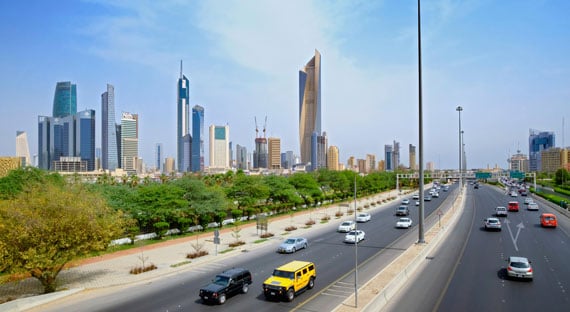
Skyline of Central Business District (CBD) and First Ring Road motorway in Kuwait City, Kuwait (Masterton/Alamy stock photos)
How Should GCC Countries Diversify Their Economies And Promote Inclusive Growth?
December 9, 2018
Recent volatility in oil prices underscore the need for the six countries in the Gulf Cooperation Council (GCC)—Bahrain, Kuwait, Oman, Qatar, Saudi Arabia, and the United Arab Emirates—to continue their reforms to diversify their economies and encourage strong, stable, and inclusive growth.
Two recent IMF papers examine how greater openness to trade and foreign investment and more developed and inclusive financial sectors can help attain these goals.
“Trade and Foreign Investment—Keys to Diversification and Growth in the GCC” explores benefits from further openness and identifies policy measures.
- Foreign trade in the GCC has been expanding robustly, though with limited non-oil exports. Foreign direct investment inflows have stalled in recent years despite measures to reduce red tape and provide incentives.
- Greater openness to trade and foreign investment can lead to higher growth in the GCC by creating jobs, enhancing productivity with new technologies, promoting knowledge, and creating a more competitive business environment.
- Closing regional gaps in foreign direct investment and exports could have a significant impact of up to one percentage point increase in real, non-oil per capita GDP growth. Promoting exports by reducing non-tariff barriers could add a further 0.2-0.5 percentage points.
- Boosting non-oil exports and attracting more FDI requires supportive policies: investing in human capital, increasing productivity and competitiveness, improving the business climate, and reducing remaining barriers to foreign trade and investment.
“How Developed and Inclusive are Financial Systems in the GCC?” surveys financial development and inclusion in the region, highlighting possible areas for further reforms.
- Financial systems in the GCC have developed significantly over the last few decades, but there is further room for progress.
- GCC countries have also made progress on financial inclusion (making financial services more widely available to everyone in society), but gaps remain in some key areas, particularly access to finance for small and medium enterprises (SMEs), women, and youth.
- Reforms to strengthen access to finance for SMEs, women, and youth, including promoting competition in the financial sector, enhancing financial literacy, and improving SME governance would all benefit growth.
- Developing debt markets and further stock market reforms would help foster financial sector development, as well as development of non-bank financial institutions, such as investment firms.


